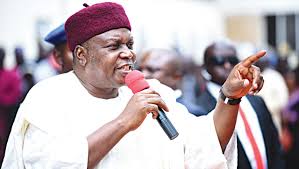Crime & Law
Alleged N27bn fraud: How Taraba ex-Gov, Ishaku told me to run away from EFCC – Witness tells court

The trial of former Taraba State Governor, Darius Dickson Ishaku, took a dramatic turn on Wednesday as the first prosecution witness, Ismail Lawal, revealed that the ex-governor advised him to go into hiding for six months to avoid interrogation by the Economic and Financial Crimes Commission (EFCC).
Testifying before Justice S.C. Oriji of the Federal Capital Territory High Court in Maitama, Abuja, Lawal disclosed that Ishaku urged him to evade the anti-graft agency at a crucial point in their investigation.
Ishaku, who is the first defendant in the case, is standing trial alongside Bello Yero, a former Permanent Secretary of the Bureau for Local Government and Chieftaincy Affairs. The duo faces a 15-count charge brought against them by the EFCC, involving criminal breach of trust, conspiracy, and the alleged diversion of public funds totaling ₦27 billion.
Speaking under cross-examination by the first defendant’s counsel, P.H. Ogbole, SAN, the witness disclosed that as the EFCC was closing in on him in furtherance of its investigation of the first defendant, he was then advised by the first defendant to run away for six months adding that the Commission arrested him while he was he was planning to submit himself to it.
“I was invited to come to the EFCC and was planning to go before His Excellency asked me to stay out. When he asked me to go, I asked how long and he said six months, but people have gone ahead of me and have given statements against me that they gave me money, so if the EFCC asked me to come and I did not come at that time, meaning they may be suspecting that I took the money,” he said.
He further stated that he was detained by the EFCC for 40 days because he couldn’t meet up with the conditions of the administrative bail. “I was in EFCC detention for 40 days because I couldn’t meet the bail conditions. I was given bail conditions on the second or third day. I also made statements before I was asked to bring sureties”, he said.
The witness also stated that he was in no position to ascertain if the assignments he undertook for the first defendant were legitimate or not, adding that he wouldn’t have carried them out if he knew they were illegitimate.
“I have no knowledge of what was going on in the offices or the communication between His Excellency and the people. My own was to go where I was told to collect money, based on instructions. So I wouldn’t know what the money was meant for. My own was to follow instructions. I wouldn’t have done them if I knew they were illegitimate assignments,” he said.
Testifying further, he said, “The assignment I have been given, I carry out. I wouldn’t know the communication or relationship between the governor and the people whom I was taking the money from. I was only under the assignment which I did. And as a governor, I didn’t believe he was sending me to carry out illegitimate assignments at that time. Mine is just to follow instructions to collect money, pay into accounts and bring the rest to him.”
He further informed the court that the EFCC did not promise or assure him that it will use him as a prosecution witness against the first defendant. “I was not informed that I would be a prosecution witness, until I read it in the dailies, then the EFCC informed me that I will be a witness. I was just asked questions which I answered. Documents were shown to me, I was asked questions based on those documents.
Justice Oriji adjourned the matter till September 30 and October 15 and 20 and November 6, 2025 for continuation of cross-examination and continuation of trial.

























